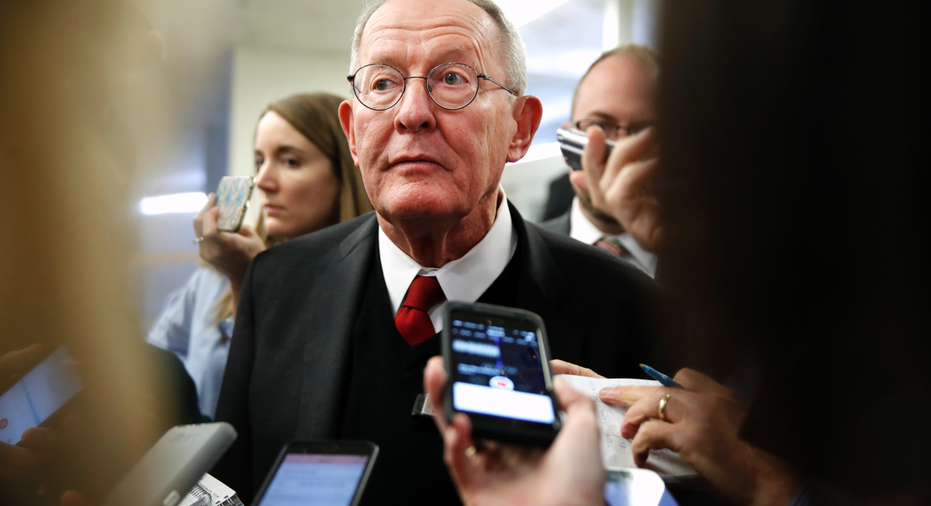Bipartisan plan to curb health premiums gets strong support

WASHINGTON – A bipartisan proposal to calm churning health insurance markets gained momentum Thursday when enough lawmakers rallied behind it to give it potentially unstoppable Senate support. But its fate remained unclear as some Republicans sought changes that could threaten Democratic backing.
Republican Sen. Lamar Alexander of Tennessee and Democratic Sen. Patty Murray of Washington said their plan had 24 sponsors, divided evenly between both parties, for resuming federal subsidies to insurers. Trump has blocked the money and without it, insurers are already raising premiums for many buying individual coverage and could flee unprofitable markets.
Senate Minority Leader Chuck Schumer said all 48 Democrats — including two independents who support them — would back the measure in a vote. That meant that combined with the dozen GOP sponsors there would be 60 votes for the plan, the number needed to overcome a filibuster, a delaying tactic meant to kill legislation.
"Every Democrat's voting for it. Do the math, baby," an exultant Schumer, D-N.Y., told reporters.
The politically compelling arithmetic raises pressure on Majority Leader Mitch McConnell, R-Ky., who's been noncommittal so far, to let the Senate consider the legislation. A McConnell spokesman offered no new statement from him.
The growing Senate support also improved the chances that the proposal would become law, perhaps later this year as part of a must-pass measure financing the entire government.
The measure would still have to clear the House, where Speaker Paul Ryan, R-Wis., and many conservatives have been cold to the idea, and win Trump's signature.
Two supporters of the bipartisan plan, GOP Sens. Lindsey Graham of South Carolina and Bill Cassidy of Louisiana, said in a statement that it "will not pass unless concerns of the House are addressed." They said they were seeking agreement on provisions adding flexibility for states to ease some requirements of President Barack Obama's health care law.
In an interview, Graham suggested making tax-favored health savings accounts more generous and giving consumers more information about medical prices. But he also mentioned letting insurers sell a wider range of lower-cost policies, which Democrats have resisted as a weakening of Obama's law.
Sen. Ron Johnson, R-Wis., has been working with House conservatives on proposals like suspending enforcement of Obama's tax penalties on people who don't buy coverage and companies that don't offer it to workers. Democrats have stood by those two cornerstones of Obama's law, which curb premiums by pulling more healthy customers into the marketplace.
Murray spokeswoman Helen Hare said the senator "believes this is a good bill, which she's already negotiated." She said Murray is open to changes that retain "the core patient protections" of Obama's law.
Alexander said Trump has encouraged him in four recent conversations to seek a bipartisan deal on the proposal.
Graham and Cassidy led their party's failed effort in September to dismantle Obama's health care law and instead send federal health care dollars directly to states as block grants. Party leaders have discussed trying anew in 2018.
Obama's Affordable Care Act requires insurers to reimburse poorer customers for out-of-pocket costs like deductibles and co-pays. It helps around 6 million people.
The law also obliges the government to repay carriers for those costs, around $7 billion this year. A federal judge concluded that Congress never properly approved the money, but Obama and Trump continued the payments until Trump halted them last week.
The Alexander-Murray agreement extends the payments for two years. It gives states additional flexibility under Obama's law and allows consumers of any age to buy low-cost catastrophic coverage plans.
When the two senators unveiled their agreement earlier this week, the president initially reacted favorably but then condemned the deal as a bailout for insurers.
Questioned in the Oval Office on Thursday, the president again sounded lukewarm.
"It'll be absolutely short term," Trump said of the bipartisan plan, "because, ultimately, we will be, it's going to be repeal and replace."
Trump added, "I don't want the insurance companies making any more money ... than they have to."
Anticipating that Trump would block the subsidies, many insurers have already boosted premiums for 2018 policies to recoup the difference. Some Republicans say restoring the federal payments would give insurers a windfall.
Alexander and Murray have built rebates and other mechanisms into their bill to ensure consumers get the funds and say they are open to changes to satisfy Trump.
Johnson gave voice to GOP frustration with the president's inconsistent response.
"It's always best for the president to be completely consistent in terms of what he's supporting or not supporting," Johnson told reporters at the Capitol. "And let's face it, he's not been particularly consistent here."



















